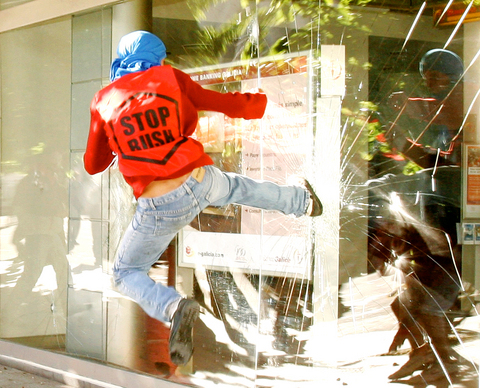US President George W. Bush braced yesterday for the second day of the 34-nation Summit of the Americas here, buffeted by anti-US protests and dogged resistance to his bid for pan-American free trade.
Riot police fired tear gas on Friday as demonstrators threw Molotov cocktails, lit bonfires and smashed shop windows some 600m from the plush hotel where leaders were meeting in the Atlantic resort city of Mar del Plata.
Hundreds of protesters in ski-masks confronted police after a larger group of some 40,000 rallied peacefully at a football stadium to voice their anger at Bush's foreign and economic policies.

PHOTO: AP
The US leader, faced with record low popularity at home as well as abroad, acknowledged the tensions after meeting with Argentine President Nestor Kirchner.
"It's not easy to host all these countries. It's particularly not easy to host, perhaps, me," allowed Bush, whose motorcade whisked past the protests.
Federal police said 64 people were arrested in the clashes, in which a bank and nearby shops were torched. By late on Friday, street violence had subsided and a security source said the situation was "under control."
However, this was not before about 30 attackers tore up sidewalks and hurled the concrete through the windows of the BankBoston branch.
A branch of British-based HSBC also was targeted and an office of local Banco Galicia was set ablaze under a barrage of Molotov cocktails. McDonald's and Burger King restaurants also had their windows smashed.
In protests elsewhere in Argentina, police in the southern city of Neuquen fired tear gas and rubber bullets to disperse demonstrators who threw eggs and stones at a Blockbuster video store, part of a US-owned chain.
In Buenos Aires, protesters covered the Obelisk, the capital's central monument, with a banner declaring "Bush Get Out." Demonstrators burned a US flag nearby.
Canadian Prime Minister Paul Martin said he was "dismayed and deeply troubled by the violence ... We in Canada believe in the free and frank exchange of ideas; peaceful demonstration is a part of this. We cannot allow the integrity of the peaceful exchange of ideas to be demeaned by the deplorable and reckless acts of a few."
Market reforms and a proposed free-trade area of the Americas (FTAA) touted by Bush have encountered growing skepticism amid persistent unemployment and poverty across the Americas.
President Hugo Chavez of Venezuela, a virulent critic of Bush and close ally of Cuba's Fidel Castro, repeated his accusation that Washington was plotting to invade his oil-rich country.
"An imperialist invasion of Venezuela will be the start of a 100-year war," Chavez told the crowd, speaking for more than two hours under driving rain.
Among anti-US activists here were Nobel Peace Prize laureate Adolfo Perez Esquivel; the populist frontrunner in Bolivia's presidential race, Evo Morales; and Argentine football idol Diego Maradona.
On arrival, Chavez, who has boosted his international profile in the region with his coffers flush with petrodollars, announced: "the FTAA is dead and we are going to bury it here."
Officials struggled to agree on the wording of the final declaration to be adopted later yesterday.
also see story:
Leave dissenters out of trade pact: Fox

SECURITY: As China is ‘reshaping’ Hong Kong’s population, Taiwan must raise the eligibility threshold for applications from Hong Kongers, Chiu Chui-cheng said When Hong Kong and Macau citizens apply for residency in Taiwan, it would be under a new category that includes a “national security observation period,” Mainland Affairs Council (MAC) Minister Chiu Chui-cheng (邱垂正) said yesterday. President William Lai (賴清德) on March 13 announced 17 strategies to counter China’s aggression toward Taiwan, including incorporating national security considerations into the review process for residency applications from Hong Kong and Macau citizens. The situation in Hong Kong is constantly changing, Chiu said to media yesterday on the sidelines of the Taipei Technology Run hosted by the Taipei Neihu Technology Park Development Association. With

CARROT AND STICK: While unrelenting in its military threats, China attracted nearly 40,000 Taiwanese to over 400 business events last year Nearly 40,000 Taiwanese last year joined industry events in China, such as conferences and trade fairs, supported by the Chinese government, a study showed yesterday, as Beijing ramps up a charm offensive toward Taipei alongside military pressure. China has long taken a carrot-and-stick approach to Taiwan, threatening it with the prospect of military action while reaching out to those it believes are amenable to Beijing’s point of view. Taiwanese security officials are wary of what they see as Beijing’s influence campaigns to sway public opinion after Taipei and Beijing gradually resumed travel links halted by the COVID-19 pandemic, but the scale of

A US Marine Corps regiment equipped with Naval Strike Missiles (NSM) is set to participate in the upcoming Balikatan 25 exercise in the Luzon Strait, marking the system’s first-ever deployment in the Philippines. US and Philippine officials have separately confirmed that the Navy Marine Expeditionary Ship Interdiction System (NMESIS) — the mobile launch platform for the Naval Strike Missile — would take part in the joint exercise. The missiles are being deployed to “a strategic first island chain chokepoint” in the waters between Taiwan proper and the Philippines, US-based Naval News reported. “The Luzon Strait and Bashi Channel represent a critical access

Pope Francis is be laid to rest on Saturday after lying in state for three days in St Peter’s Basilica, where the faithful are expected to flock to pay their respects to history’s first Latin American pontiff. The cardinals met yesterday in the Vatican’s synod hall to chart the next steps before a conclave begins to choose Francis’ successor, as condolences poured in from around the world. According to current norms, the conclave must begin between May 5 and 10. The cardinals set the funeral for Saturday at 10am in St Peter’s Square, to be celebrated by the dean of the College